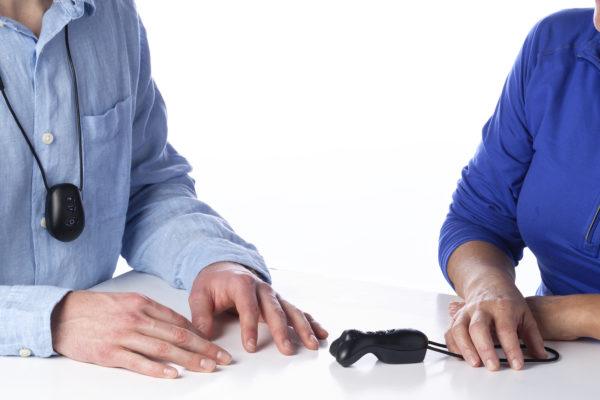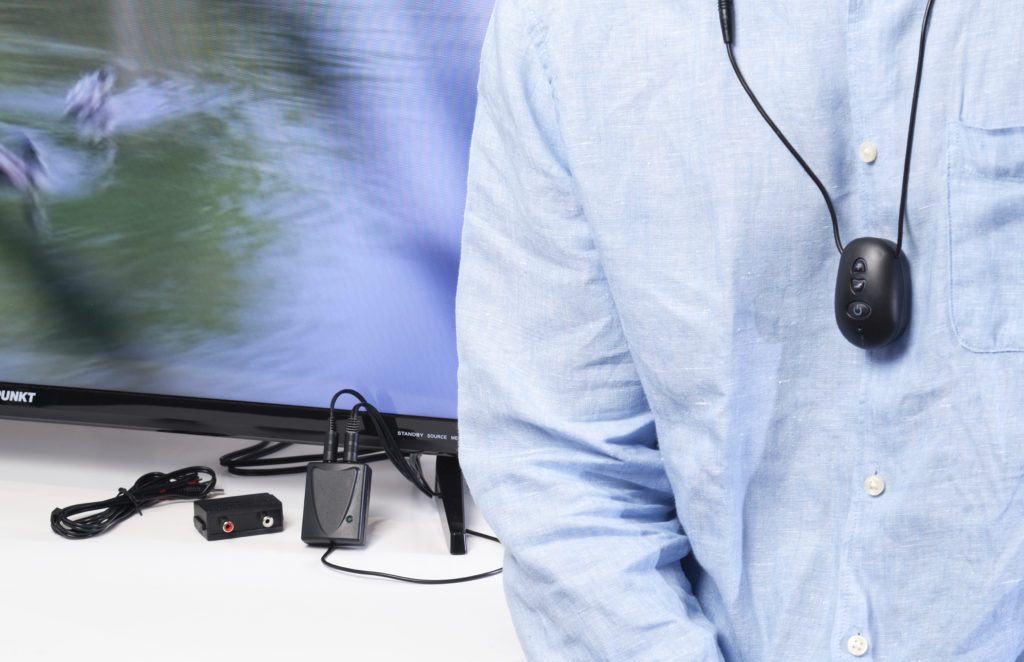Assistive equipment

Hearing aids are crucial for many people, but lots of other assistive equipment can work with, or alongside, them to help you with different parts of your life – from feeling safe at home to listening to music and watching TV.
The range of different equipment on offer can seem quite daunting at first. It’s worth asking for some suggestions from our Helpdesk or your audiologist.
Here are some things that people find useful:
Alerters for doorbells or phones
These help draw your attention by making an additional sound, having flashing lights, or vibrating (or a combination of these). (You can also get alarm clocks with a vibrating pad or flashing light.)
If you’re a BT customer and find it difficult to hear the phone ring, BT can provide you with one ToneCaller II (which makes an extra sound when the phone rings) free of charge.
“It’s reassuring to know that I won’t miss the postman when he rings the doorbell with a parcel. My alerter flashes to let me know someone’s there.” — Marc
To find out more, call 0800 800 150 or go to bt.com/includingyou
Paging systems
You can set up these to get alerts from a range of different devices (like a smoke alarm and alarm clock as well as the doorbell and phone) using radio signals.
You can get different kinds of receiver – including ones you can clip to your clothes, wear on your wrist or even put under your pillow.
“I need to know when my daughter wakes up after taking a nap. The baby monitor links to my pager and buzzes on my wrist to let me know I’m needed.” — Sarah
FM systems (personal listeners)
An FM system picks up the speaker’s voice through a microphone that they wear, and then sends a wireless radio signal to a small receiver attached to the hearing aid, so you’ll get a clearer sound.
“I was beginning to find group meetings at work difficult and stressful, with too many people speaking at once. Finding out about a personal listener was like a revelation. I can tune in to what’s being said much better.” — Lyndon
Browse our website to find out more about FM systems, and visit our online shop to view our range of personal listeners.
Hearing loops
A hearing loop system gives you a clearer sound with less interference and background noise. It works by turning the sound source into a wireless magnetic signal that’s picked up by hearing aids or cochlear implants when they’re set to the ‘T’ (telecoil) setting.
Using a hearing loop with the ‘T’ setting on your hearing aids can be useful in all kinds of situations, like on the phone (where it’s often called an inductive coupler) in your home (for example, to help you hear the TV) and in public places where you see the hearing loop symbol.
“I use the hearing loop at the counter at the bank and at the supermarket, so I tried plugging a loop system into my TV too. It makes a massive difference. And my husband has stopped complaining about the TV being too loud.”
Joyce
Find out more about hearing loops.
Streamers
A streamer is a small device you wear around your neck on a cord. It connects the sound wirelessly from an mp3 player, mobile phone, laptop, TV adaptor or other device to your hearing aids, helping you hear more clearly.
A streaming device will need to be compatible with your hearing aid, so it’s best to check what’s available – with your audiologist, our Helpdesk, or online.
“I had to do some investigating, but I’ve found a brilliant streamer that works with my mp3 player and my phone. I don’t even have to bother getting my phone out of my pocket when it rings, so I can answer it and talk easily.” — Phil
A Bluetooth neckloop
This is like a streamer, but it’s compatible with any kind of mobile phone, and with most hearing aids that have a ‘T’ setting. They use Bluetooth technology to connect to the phone and then the ‘T’ switch in your hearing picks up the sounds of the call from the loop.
Both Bluetooth neckloops and streaming devices are small (smaller than a mobile phone) and fit comfortably around your neck. They can be tucked under clothes for extra privacy if required.
Headphones
You can plug headphones into your TV, phone or other device to get the sound directly into your ears.
“The headset lets me hear the TV at the right volume, without affecting everyone else in the room. I take my hearing aid out and listen through the earpieces.” — Carol
How to obtain assistive equipment
Visit our online shop
Our online shop, which is part of Hearing Dogs for Deaf People, sells a range of products for people with hearing loss including assistive equipment such as alarm clocks. We also stock earplugs, hearing aid batteries, and awareness items such as pin badges, stickers, wristbands and much more.
Sensory services team
Your local authority will have a sensory services team whose job it is to provide support for people with disabilities. They may either advise you which assistive equipment to buy or loan you the equipment you need or give you a grant to buy the equipment you need. Each department has its own rules and budget so the help you get will depend on where you live.
Fire Brigade
Many local Fire Brigades will supply visual or tactile smoke alarms for people who are hard of hearing or deaf. They are often available free of charge. The criteria may vary in different areas, for example, some Fire Brigades only issue free equipment to hard of hearing people who live alone. However, it is worth asking for help and advice at least.
Audiology departments
Some audiology departments employ a hearing therapist, specialist audiologist or equipment officer who will advise you about equipment. Several departments have a small selection of equipment for you to have a look at. They will also refer you to a sensory services team or provide you with suggestions as to where it can be bought.
Buy the equipment
There are several reliable firms that supply special equipment for people with a hearing loss. It is important to shop around and compare prices. Some assistive equipment providers offer a try before you buy scheme, but this is variable. Contact our Helpdesk if you want support in finding equipment suppliers or a product that’s right for you. You can also ask your local audiology department, hearing therapist, private hearing aid dispenser, lipreading teacher, hard of hearing group and social services department for more suggestions and information.
What about my work or places I visit?
Not sure what assistive equipment could or should be made available by a business or organisation to help you communicate and participate? Contact our Helpdesk for advice and information.
Webpage updated: June 2024
